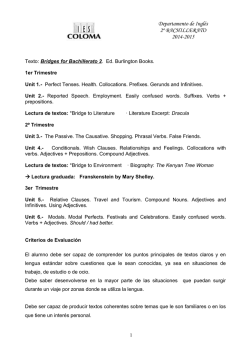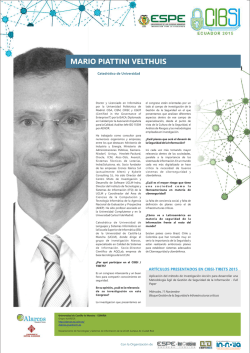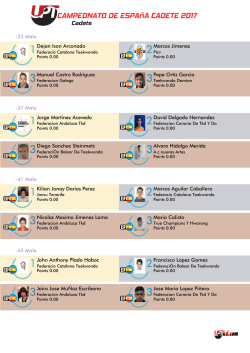
INFORMACIÓN PRUEBAS EVAU
INFORMACIÓN PRUEBAS EVAU ASIGNATURA DE INGLÉS CURSO ACADÉMICO 2016/2017 Mª BEGOÑA RUIZ CORDERO [email protected] INFORMACIÓN IMPORTANTE • CONTENIDOS PARA EL CURSO 2016/2017 • MODELO DE EXAMEN • CRITERIOS DE CALIFICACIÓN Y CORRECCIÓN - CORRECCIÓN Y CALIFICACIÓN DEL WRITING - RÚBRICA CORRECTORA - ERRORES A EVITAR • TEMAS RELEVANTES CONTENIDOS PARA EL CURSO 2016/2017 - Determiners and pronouns. Sentence-structure: questions, negatives, imperatives, let’s, question tags. Adjectives and adverbs. Comparison, degree. So/such; too/enough. Be, do and make. Modal auxiliary verbs. Tenses: present, future, past and perfect tenses. Passive voice and reporting (personal and impersonal) passive voice. Verbs patterns. Direct vs. Reported speech. Conditionals. I Wish / If only. Relative clauses. Have something done. Conjunctions and linking words. Prepositions. MODELO DE EXAMEN • Mismo modelo de examen que en la convocatoria anterior: http://www.uclm.es/preuniversitario/paeg/modelos1516.asp Habrá dos propuestas de examen a elegir una • Estructura de cada propuesta: I. READING COMPREHENSION (2 points): Cuatro preguntas TRUE /FALSE (copy the evidence from the text) II. LEXICON / PHONETICS (2 points; 1 point each section) III. USE OF ENGLISH (3 points; 0,5 each rephrasing) IV. COMPOSITION (3 points) CRITERIOS DE CALIFICACIÓN Y CORRECCIÓN http://www.uclm.es/preuniversitario/paeg/criterios1415.asp CORRECCIÓN Y CALIFICACIÓN DEL WRITING • PARA LA CORRECCIÓN Y CALIFICACIÓN DE LA COMPOSICIÓN: Rúbrica de evaluación: Writing ERRORES A EVITAR MISTAKE EXAMPLE MISTAKE EXAMPLE Verbs without a Subject. …because is very important. Interrogatives Mistakes with the verb “to be.” My friends is in my village. They was in the hotel. You was surprised. Do he watches television? what he liked? Did they played football? Negatives Mistakes with the verb “Have” She have 3 brothers. He not go to the cinema. She don’t drink beer. He didn’t went to London. Age with verb “have” Present continuous without “to be.” I have the same age than he. while she having a shower… I doing an exam now. Mistakes with the Simple Past he thinked/thank that… they comed early… he throught… Adjectives after nouns. Adjectives in plural. Plurals (countable/uncountable/ir regular). A present very nice I saw importants buildings… Most childrens like playing People is very nice… My fathers live in Bolaños… Modal Verbs I can to go to England. you must to listen. I will can live in France No “-s” for third person used Talking about past /future events with no tense inflection / without the auxiliary. Personal Pronouns I saw his in the street. /Possessive adjectives and They sent my a letter… pronouns You teacher is serious… Fixed expressions I’m from in Spain. Comparatives I like the same than/that you. …more bigger than… “Like” I like listen to music. I would like visiting NY. Other thing that liked me… Basic prepositions: in, on, at on summer at the South He go to England every year. Last summer, they go to Scotland. In 2020 life be harder. TEMAS RELEVANTES • En el ejercicio de Reading Comprehension: - Se ha de copiar la parte del texto que demuestre la respuesta de true o false, lo que supone que en ocasiones se pueda copiar un sintagma y no necesariamente una oración completa de punto a punto. - Como norma, se han de evitar los puntos suspensivos. Se recomienda que los alumnos escriban la palabra completa True o False en lugar de las iniciales (T o F). - No se aceptará que contesten Verdadero o Falso en Español ni V o F. • En la parte de Use of English: - Se penalizará con 0,25 puntos el hecho de no incluir las comas en una oración de relativo del tipo “non-defining” o ponerlas cuando no es necesario. Será ese el criterio que se aplicará. - Poner el agente en un rephrasing de voz activa a pasiva penaliza con 0,25 puntos caso de no ser necesario (en sujetos activos del tipo “they”, “people” o “someone”, entre otros). • En la composición: - No se pedirá al alumno escribir un diálogo, ni resumen, ni carta o e-mail. - El alumno deberá desarrollar un tema en una redacción de tipo argumentativo, de opinión, descriptivo o narrativo. - Se ha de desarrollar el tema propuesto. - Si el alumno desarrolla un tema distinto, la redacción se calificará automáticamente con un 0. - Se penalizará el hecho de que el alumno se desvíe del tema propuesto así como la inclusión de párrafos que no sean de su autoría (extraídos de una canción, por ejemplo). - En ningún caso se penalizará al alumno por escribir más de 125 palabras. De hecho, se indicará en la propia composición: “Write a composition of AT LEAST 125 words…” RUEGOS Y PREGUNTAS MUCHAS GRACIAS POR SU ATENCIÓN [email protected]
© Copyright 2026



